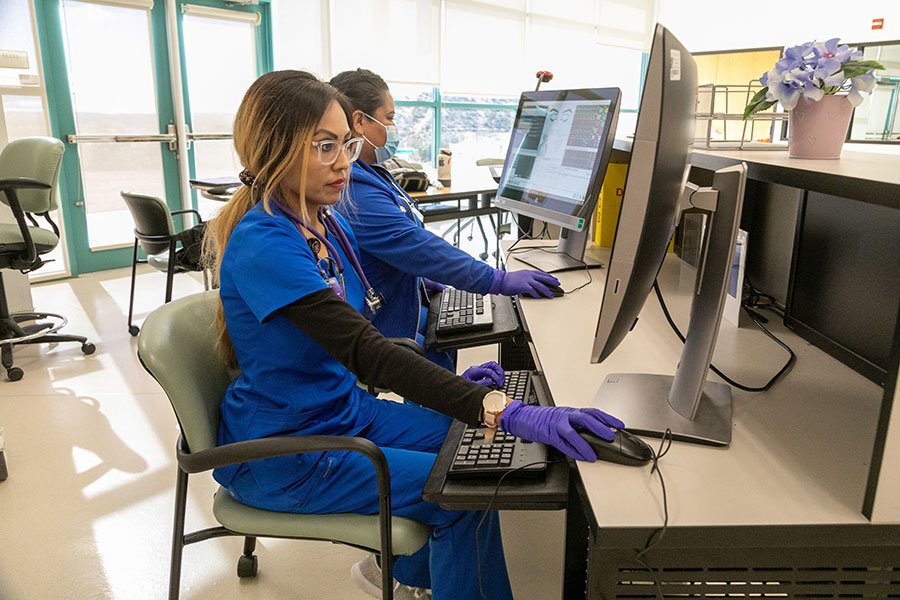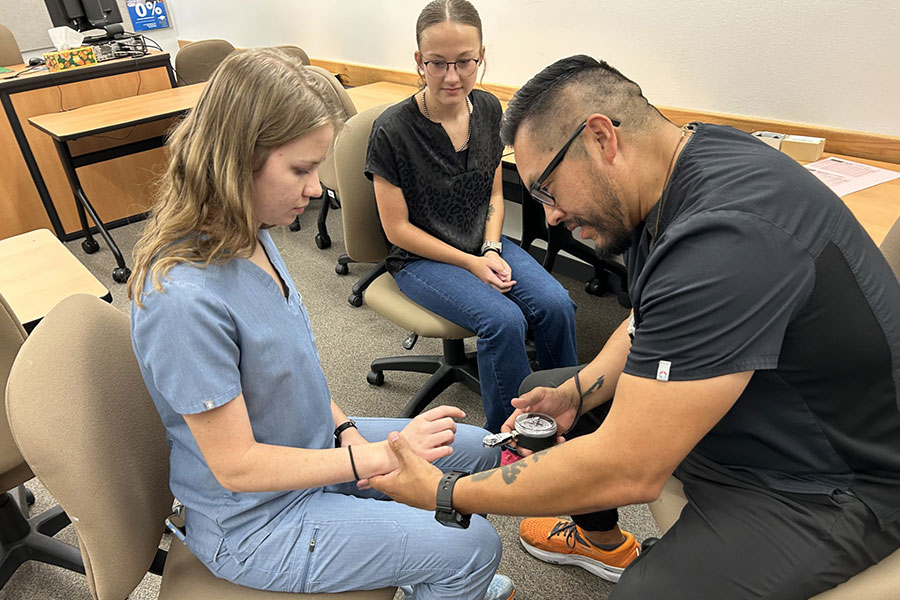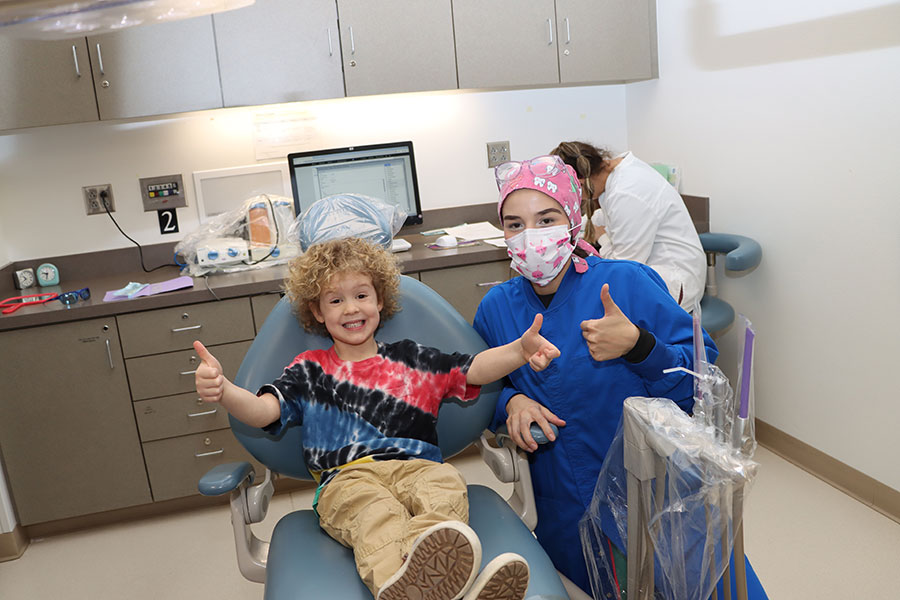The tasks and responsibilities of Certified Nursing Assistants involve patients' daily living activities. Learn what a CNA is and how to become one today.

Whether you’re looking to start your career in healthcare or transition from another field, becoming a Certified Nursing Assistant (CNA) offers a rewarding path forward. CNAs serve as essential caregivers who provide hands-on patient support while serving as the eyes and ears for nursing teams.
Looking for a healthcare career with meaningful patient interaction and growth potential? This guide explores what CNAs do day-to-day, the benefits of earning CNA certification, and how this role compares to other healthcare positions. According to the Bureau of Labor Statistics (BLS), healthcare employment is projected to grow at a faster rate than other professions between 2021 and 2031, making now an excellent time to explore this fulfilling field.
What Does a CNA Do? Day-to-Day Responsibilities
As a CNA, you’ll work under licensed nurses' supervision in diverse healthcare settings such as hospitals and clinics. Your primary responsibilities will focus on helping patients with their activities of daily living, also known as ADLs, while monitoring their condition, reporting important changes to nursing staff, and performing other essential duties.
Essential Patient Care Duties
The core of your job as a certified nurse assistant involves direct patient care, tracking patient health, and using medical technology. Tasks include:
- Mobility assistance: Help patients walk, move, and reposition; take vital signs like temperature, pulse, blood pressure, and respiration rates
- Hygiene assistance: Help patients bathe, shower, and maintain oral hygiene; assist with grooming, dressing, and bathroom visits
- Nutrition support: Ensure proper hydration, help patients eat, and track food intake
- Basic wound care: In some settings, assist with changing simple dressings and caring for wounds under nurse supervision
- Patient communication: Inform families and patients about the tasks you will complete, and communicate with empathy
- Use of medical technology: Use basic medical technologies, such as electronic health record systems, portable vital sign monitoring, or mobility devices
Documentation and Communication Responsibilities
Beyond hands-on care, you’ll serve as a vital communicator on the healthcare team. Daily communication responsibilities of a CNA include:
- Recording vital signs, food and fluid intake, and daily care activities in charts
- Communicating changes in patient condition to supervising nurses
- Noting patient concerns or requests
- Communicating with family members about basic care
Environment-Related Tasks
As a CNA, you’ll help maintain safe, comfortable patient care environments by making beds and changing linens, keeping rooms clean and organized, and stocking supplies. You’ll also manage and care for patients’ personal belongings and ensure safety measures are followed, such as keeping call buttons within patients’ reach.
What Can You Do With a CNA Certification?
A CNA certification demonstrates your ability to provide compassionate, skilled care while meeting state-mandated standards, opening doors to a variety of experiences in the healthcare industry, many of which have growth potential.
Employment Opportunities
With a CNA certification, you can work in diverse employment settings. According to the BLS, long-term care facilities like nursing homes and assisted living facilities employ the highest number of CNAs. Other opportunities include:
- Adult day services
- Emergency departments
- Home health agencies
- Labor and delivery hospital departments
- Medical-surgical hospital departments
- Rehabilitation centers
Specialized Work
Many CNAs specialize in areas that align with their interests and strengths. You may focus on geriatric care (working with elderly patients) or pediatric assistance (supporting nurses in children’s hospitals or pediatric offices). Some CNAs become psychiatric aides working with mental health patients, while others concentrate on rehabilitation or hospice care.
Career Advancement Pathways
Becoming a certified CNA can be the first step on a healthcare career ladder with numerous advancement opportunities. Many healthcare professionals begin as entry-level CNAs and use this foundation to grow into roles with increased responsibility, specialized skills, and higher compensation. With additional training, education, and experience, you can become a:
- Healthcare administrator
- Licensed practical/vocational nurses (LPN/LVN)
- Medication aide/technician authorized to administer medications
- Patient care technician with skills in phlebotomy or EKG
For those seeking further advancement, the Registered Nurse (RN) path requires additional education (typically 2-4 years) but builds naturally on your CNA experience. Your hands-on patient care background also creates pathways into healthcare administration and managerial or supervisory roles.
Description of CNA Duties by Work Setting
The responsibilities of a CNA may vary depending on where they work. Here’s how duties might differ across settings:
Hospitals
In hospitals, certified nursing assistants typically:
- Work at a faster pace with changing patient populations
- Assist with admission and discharge procedures
- Perform more frequent vital sign checks
- Transport patients between departments
- Respond quickly to changing patient conditions
Long-Term Care Facilities
In nursing homes and assisted living centers, CNAs often:
- Develop more ongoing relationships with residents
- Focus on quality of life and social interaction
- Support residents with chronic conditions
- Help maintain daily routines and schedules
- Provide end-of-life care when needed
Home Health Care
When working in the homes of patients with a multitude of conditions, CNAs:
- Provide more personalized, one-on-one care
- Help patients maintain independence in their environment
- Manage medications (with appropriate training)
- Coordinate with family caregivers
- May assist with housekeeping, meal preparation, errands, or driving patients to appointments
CNAs vs. Other Healthcare Roles
Understanding key differences between CNAs and other healthcare positions can help you decide which career path best matches your goals and interests. Each role has distinct educational requirements, responsibilities, and work environments.
Many entry-level positions in healthcare require certification. Read our guide on the different healthcare certifications and which one may be right for you.
CNA vs. Registered Nurse (RN)
To become a Certified Nursing Assistant (CNA), you must complete a 4—to 12-week certification program that teaches basic patient care and assistance with daily activities (ADLs).
In contrast, Registered Nurses (RNs) require 2 to 4 years of education through an associate or bachelor’s degree. RNs assess, plan, and evaluate patient care, administer medications, supervise CNAs, and generally earn higher salaries with greater autonomy in their roles.
CNA vs. Medical Assistant (MA)
CNAs care directly for patients in hospitals and long-term care settings, while Medical Assistants combine clinical and administrative duties primarily in outpatient settings like clinics or physicians’ offices.
MAs may also manage patient records and work under physician supervision to perform more advanced procedures such as administering medication. MAs typically need more education and training than CNAs.
CNA vs. Phlebotomist
While CNAs provide comprehensive basic care focusing on comfort and assisting with daily living activities, phlebotomists specialize in blood collection. They receive technical training for this, such as how to find a vein and insert an IV.
Phlebotomists typically have shorter patient interactions, as their role is specialized and defined by their expertise. They primarily work in laboratories, hospitals, or blood donation centers.
CNA vs. Emergency Medical Technician (EMT)
EMTs respond to emergencies outside healthcare facilities, providing immediate, life-saving interventions. Their work focuses on stabilization and transport, requiring different certifications and specialized training in emergency medicine.
In contrast, CNAs provide ongoing care to stable or chronically ill patients in controlled healthcare environments. They focus on routine care needs and place less emphasis on emergency interventions.
How to Become a CNA
Becoming a CNA requires specific state-approved training, ensuring you have the necessary skills to provide safe, competent patient care. Here’s your roadmap to certification:
Step 1: Complete a State-Approved Training Program
Enroll in a state-approved CNA program to begin preparing for nurse assistant certification as required in your state. These programs are often offered by community colleges, technical schools, or healthcare facilities and typically last between 4 and 12 weeks.
Most CNA programs combine real or simulated clinical practice with classroom learning in medical terminology, basic nursing principles, anatomy and physiology, infection control, patient rights, and communication techniques.
Step 2: Earn Certification By Passing Your State’s Examination
After completing your training program, you must register, take, and pass your state’s certification exam. This exam may consist of a written examination and a skills demonstration component.
Step 3: Get Listed as a Certified Nurse Assistant in Your State
After you pass the certification exam, you are placed on your state’s nurse aide registry, which verifies your certification status for potential employers and provides an official record of your professional credentials. This sometimes includes additional requirements, such as passing a background check.
Step 4: Maintain Your Certification
In most states, a CNA certification isn’t permanent. You must regularly renew your certification to stay certified and ensure your skills remain current. Depending on the state in which you’re certified, this may require continuing education, working a minimum number of hours, and renewing every 2 to 3 years.
What Makes a Successful CNA?
In addition to certification, certain qualities, personality traits, or work style preferences help CNAs excel:
- Attention to detail
- Communication skills
- Emotional resilience
- Empathy and patience
- Physical stamina
- Problem-solving abilities
- Time management
Finding the Right CNA Program
The quality of your chosen CNA training program impacts your preparedness for certification exams and future job performance. When researching CNA programs, consider several factors to identify the ones that align with your needs and goals.
- State approval: Many states’ certification requirements include a state-approved program.
- Faculty expertise: Instructors with extensive experience provide practical insights.
- Clinical components: Comprehensive hands-on training prepares students for the realities of patient care.
- Program flexibility: A crucial component if you’re balancing work or family responsibilities.
- Exam pass rates: An effective CNA program may have higher pass rates on credentialing exams.
- Career services: Strong career programs demonstrate an institution’s commitment to your long-term success.
Is a CNA Career Your Next Move?
Beyond being a job, becoming a CNA involves embracing an in-demand role that profoundly impacts vulnerable individuals during challenging times. This career suits those who:
- Find fulfillment in direct human connection
- Have a passion for patient care
- Seek job stability in an in-demand industry
- Want to create a foundation for various careers in healthcare
Becoming a CNA is also a fantastic choice if you’re drawn to healthcare but unsure about the time it takes to become a nurse. Compared to more lengthy nursing programs, a CNA certification program can sometimes be completed in just a few months, offering a valuable testing ground for the field. Many registered nurses began as CNAs, using the experience to confirm their passion for patient care before pursuing advanced education.
Take Your Next Step Toward a CNA Career
Whether you’re starting your healthcare career or looking to change direction, CNA certification provides valuable skills, meaningful employment, and the foundation for continued growth in the expanding healthcare field.
Ready to explore CNA training options or learn more about healthcare career paths? At San Juan College, we’re here to help you navigate your journey in this rewarding profession. Contact us today!



